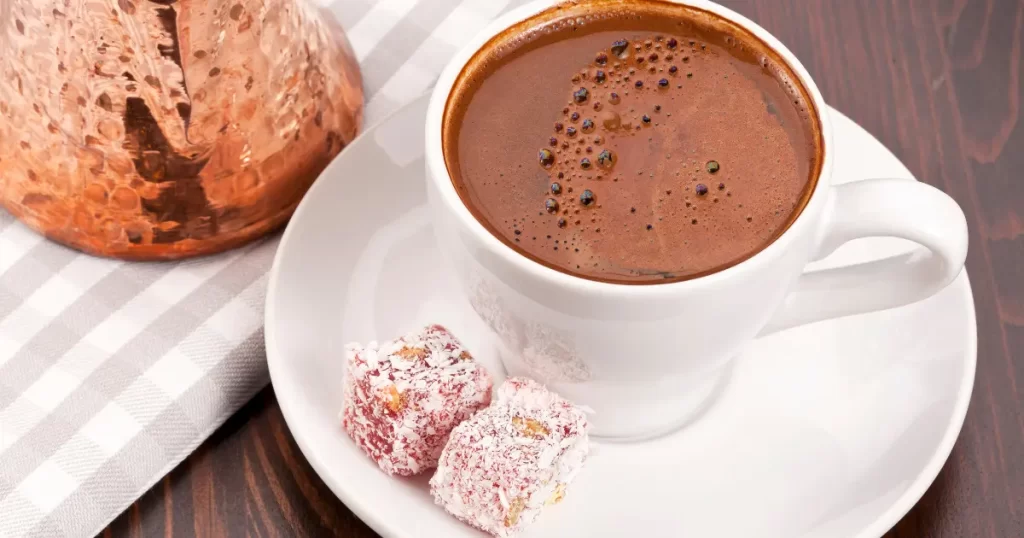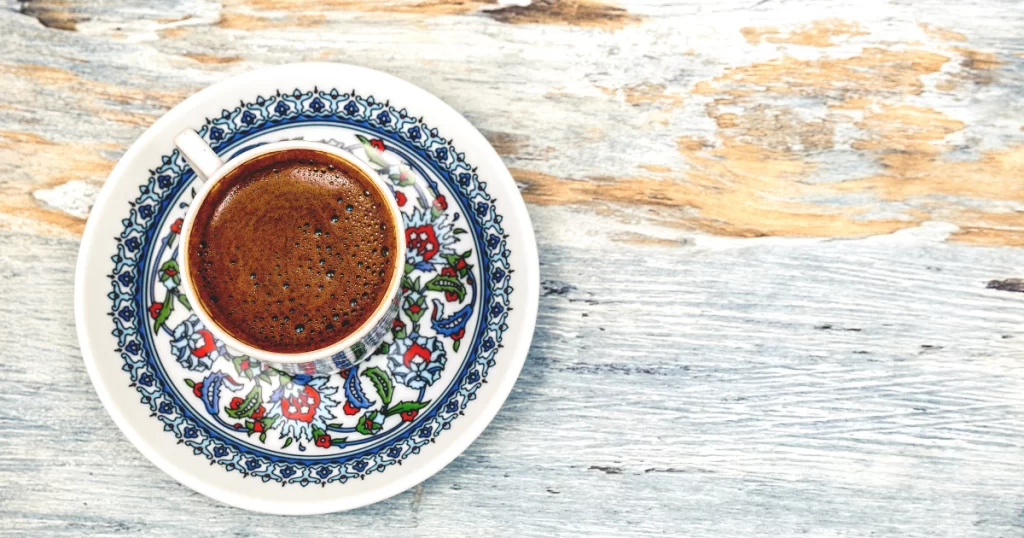You don’t need a plane ticket to Istanbul to try this magic brew. You can make a perfect cup of Turkish coffee at your home. Even if brewing authentic Turkish coffee requires a specific pot and fresh ground coffee, here you will also see alternative ways for people who don’t have all this equipment hanging out in their kitchen. Let’s look at everything you need to know on how to make Turkish coffee.
💡 Make sure to check out the best Turkish coffee kit for your home.
Best Turkish coffee recipe
Let’s take a look at how to make authentic Turkish coffee.
Ingredients for one cup of coffee
- Coffee 7 grams
- Water 2.3 oz (70 ml)
- Sugar (optional)
How to make Turkish coffee guide
- Step 1: This coffee demands finely ground coffee. It should be as fine as cocoa powder, no less. It is best to use freshly ground coffee, but you can also get a pre-ground option.
- Step 2: When you have measured coffee and water, now it is time to mix it all in a special pot called ibrik or cezve. Brewing with ibrik is the traditional way, but If you don’t have it, any other pot will do.
- Step 3: Add sugar if you want. Traditional Turkish coffee can be made with or without sugar. It’s entirely up to your taste.
- Step 4: Give everything a good stir and place the pot on low heat. Until the coffee is finished, do not touch it anymore.
- Step 5: As the coffee heats, keep an eye out for the “bloom.” This will happen just before the boiling point, and you will notice it when the foam starts to rise. Once you see the bloom, remove the pot from the heat immediately. Don’t let your coffee reach the boiling point.
- Step 6: Pour the coffee into the cup and let it rest for a minute or two to let the sludge settle to the bottom.
How much sugar to add to Turkish coffee?
The amount of sugar added typically ranges from none at all (sade) to very sweet (şekerli). The most common option is one teaspoon of sugar. Just make sure to add sugar at the beginning of the brewing process, as the Tasting Table confirms.
If you prefer your coffee to be less sweet or sugar-free, you can request “az şekerli” (a little sugar) or “sade” (sugar-free) when ordering.
Alternative recipes you need to try
Looking for interesting Turkish coffee variations? Here are a few alternative recipes that you can explore:
Turkish coffee with spices
If you enjoy a hint of spice in your coffee, you can experiment by adding cardamom, cinnamon, or cloves. These aromatic spices elevate the flavor profile and create a unique cup of coffee. Here you can find the best 6 Turkish coffee species and detailed instructions on how to properly add them.
Turkish coffee with milk
This is definitely not a traditional brewing method, but it tastes amazing. Here you can learn how to correctly add milk to your Turkish coffee.
Iced Turkish coffee
If you’re looking to brew Turkish coffee in a totally unique way, try adding ice. Iced Turkish coffee is perfect for hot summer days or when you want a chilled coffee treat.
How to make Turkish coffee at home – Easy ways
Getting a traditional Turkish coffee pot for your home is a great investment. The design of this pot plays a crucial role in achieving the perfect taste that elevates the entire coffee-drinking experience.
These pots are specifically designed with a long handle and a narrow neck, which allows for precise control over the brewing process.
While it’s possible to enjoy Turkish coffee at home using a regular pot or even alternative methods like a microwave or espresso machine, these alternatives may not provide the same authenticity and flavor.
Pro tip: If you have an induction stove, you need to be careful with your choice since most pots won’t work on it. Here you can find the best Turkish coffee pots for induction stovetops.
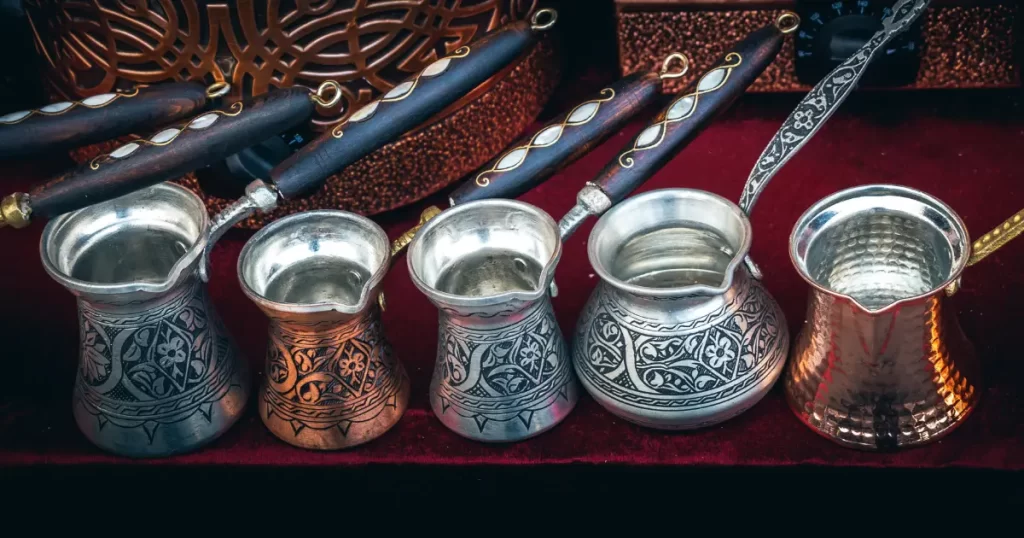
Turkish coffee or Espresso: Which is better?
Turkish coffee and espresso may both be coffee, but they’re as different as night and day. In order to make espresso, hot water is forced through finely ground coffee. It’s a quick, intense coffee experience.
The Turkish coffee process is slow, and brewing happens in a small pot called a cezve or ibrik. It involves a unique method where extremely finely ground coffee is simmered (but not boiled) with water and optionally sugar.
Now, which is better? Well, it’s like comparing apples and oranges. They’re both fruit, yes, but they offer different tastes, textures, and experiences. If you love a quick, intense shot of coffee, go for espresso. But if you’re a fan of a slow, relaxing coffee experience that you can savor, Turkish coffee is the way to go.
It’s also worth noting that Turkish coffee is the grandfather of a whole family of coffees. Greek, Cyprus, Armenian, and Bosnian coffee – they’re all variations of Turkish coffee, just with different names.
How to serve Turkish coffee?
Turkish coffee serving tradition is connected with small and delicate cups called “fincan.” These cups add a touch of elegance to the whole ritual.
It is pretty popular to serve a small sweet treat alongside the coffee. One popular choice is Turkish delight, a gelatinous candy bursting with flavors like rose, pistachio, and lemon. The combination of the bittersweet coffee and the sweet taste of delight creates a harmonious balance of flavors. Here you can find more treats that you can combine with Turkish coffee.
Keep in mind that this coffee is not meant to be gulped down in a hurry. It’s a beverage that demands your attention and appreciation. The grounds settle at the bottom of the cup, creating a thick and velvety consistency. By drinking it slowly, you allow the flavors to mingle with the grounds.
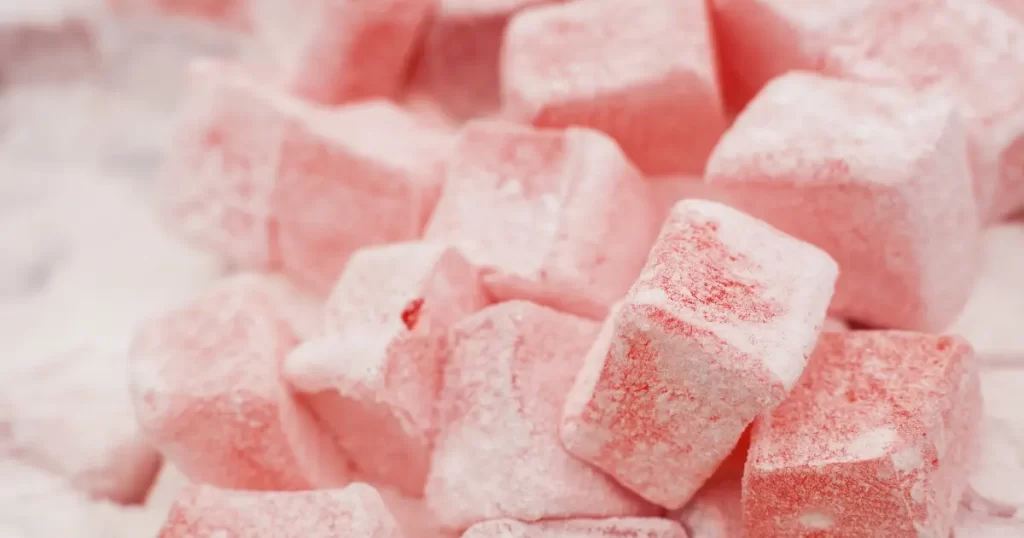
What do you need to know about Turkish coffee culture?
This coffee holds such significance that it has been recognized by UNESCO as an Intangible Cultural Heritage of Humanity. This prestigious recognition is a testament to the deep-rooted cultural value and historical importance of this coffee in Turkish society.
Fortune-telling with Turkish coffee
This beverage is also connected with fortune-telling. Because coffee isn’t filtered, after drinking, you can get patterns people believe reveal glimpses of the future. This practice is known as “tasseography” or “coffee cup reading.”

Weddings
One of the common Turkish coffee traditions is for the bride-to-be to trick her future husband when he comes to ask for her hand. She will add salt to the coffee to test his reaction, according to Middle East Eye.
This custom can also be a reminder that marriage isn’t always sweet. It goes without saying that you need to finish that salty cup of coffee without reaction to show you are a strong and unfazed person.
What is essential Turkish coffee equipment?
These 3 pieces of equipment are critical for an authentic coffee-drinking experience.
Cezve
A small, long-handled coffee pot is the heart and soul of this type of coffee brewing. A good cezve for Turkish coffee provides precise control and ensures that the coffee is prepared to perfection.
The unique design and material, usually copper or brass, ensure that heat is evenly distributed.
Grinder
Turkish coffee grinding size should have powder consistency, finer than most other brewing methods. Using pre-ground coffee won’t give you the same freshness and aroma. So, invest in a good quality grinder and grind your coffee beans just before brewing for the best results.
Cups
The fincan are small and delicate cups designed specifically for this Turkish beverage. Colorful patterns and vibrant colors make this piece stand out. Here you can find some of the most unique Turkish coffee cups that will be perfect for your kitchen.
Tips for achieving the perfect foam in Turkish coffee
For this beverage, foam is the same as cream for espresso. However, many people struggle to get a cup with a thick layer of coffee foam.
Some of the main reasons are the constant stirring of the coffee or too much heat.
Whatever the reason is, here are the tips for perfect Turkish coffee foam, no matter if you make one or five cups at the same time.
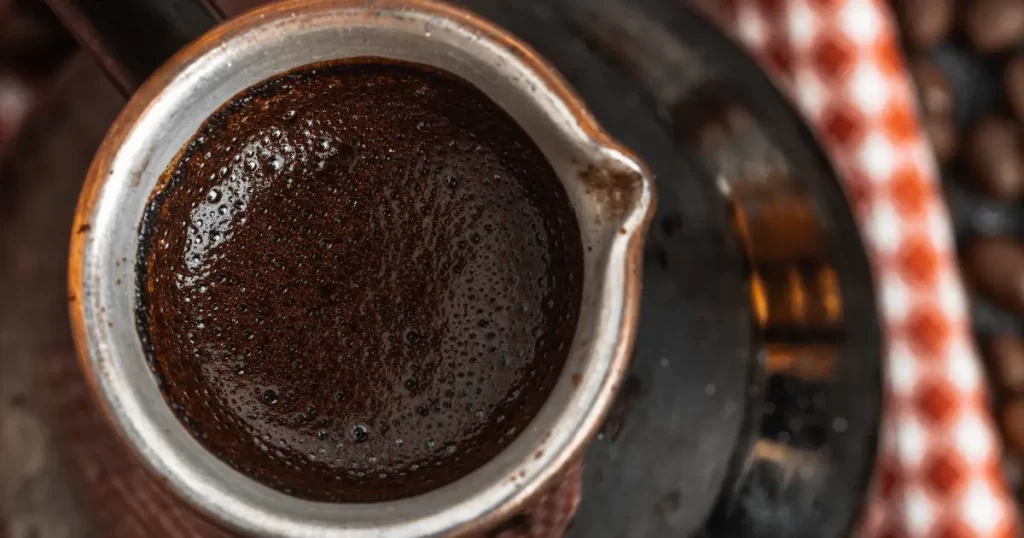
Top 3 common mistakes to avoid
To prepare a perfect cup every time, make sure to follow these Turkish coffee tips.
- Using the wrong grind: This type of coffee requires an extremely fine grind, even finer than espresso. Using a coarse grind will result in a weak and watery cup. Invest in a grinder that can achieve a powder-like consistency to ensure the best extraction of flavors.
- Rushing the brewing process: It is meant to be brewed slowly over low heat, allowing the flavors to develop gradually. Rushing the process by using high heat can result in burnt or bitter flavors.
- Stirring the coffee after pouring: It is meant to be enjoyed with the grounds settled at the bottom of the cup. Stirring will disturb the grounds and affect the taste. Instead, let the coffee rest for a moment to allow the flavors to settle.
How strong is Turkish coffee?
Turkish coffee strength will depend on several factors. How much water you add, how many grams of coffee you use, and even what kind of coffee brand you are using. Generally, it is weaker than espresso and stronger than regular coffee.
When it comes to caffeine, Turkish coffee has around 25 mg on average. Here you can learn more about the myths that surround the caffeine in this Turkish beverage.
FAQ
What type of coffee grounds are best for Turkish coffee?
In my humble opinion, you can’t beat Arabica beans. It’s all about the boldness and depth of flavor, and Arabica gives you that in spades. You might want to experiment with different roasts, but generally, a medium to dark roast works best.
How fine should the coffee grounds be for Turkish coffee?
The finer, the better! This type of coffee demands almost powdery grounds – finer than espresso. The coffee should be so fine that it dissolves in the water. Think of it as the dust of the coffee world.
Can I add sugar while making Turkish coffee?
This is where personal taste comes into play. You can definitely add sugar to your Turkish coffee – just do it at the beginning while you’re brewing.
Is it essential to use cold water for brewing Turkish coffee?
It’s not just essential. It’s the law! Well, not really – but it’s certainly the traditional way. Cold water gives you control over the brewing process, allowing the coffee to heat slowly and extract all those delightful flavors.
My journey through renowned bars and coffee shops over five years, as a barista, coffee aficionado, and former bartender, has honed my pursuit for the perfect cup. My passion for coffee isn’t just about the brew—it’s about sharing the knowledge and insights I’ve gleaned along the way.

